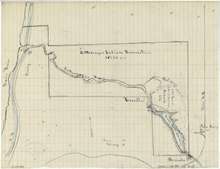Cattaraugus Reservation
Cattaraugus Reservation is an Indian reservation of the federally recognized Seneca Nation of Indians, formerly part of the Iroquois Confederacy located in New York. As of the 2000 census, the Indian reservation had a total population of 2,412. Its total area is about 34.4 mi² (89.1 km²). The reservation stretches from Lake Erie inward along Cattaraugus Creek,[1][2][3] along either side of NY 438. It is divided among three counties for census purposes:
- Cattaraugus Reservation, Cattaraugus County
- Cattaraugus Reservation, Chautauqua County
- Cattaraugus Reservation, Erie County.

Cattaraugus Reservation | |
|---|---|
 Cattaraugus Reservation | |
| Coordinates: 42°33′N 79°01′W | |
| Country | United States |
| State | New York |
| Counties | Erie, Chautauqua, and Cattaraugus |
| Population (2010) | |
| • Total | 693 |
| Time zone | UTC-5 (EST) |
| • Summer (DST) | UTC-4 (EDT) |
| Area code(s) | 716 |
| Website | Seneca Nation of Indians |
Background and location

A small cluster of Seneca-owned businesses are located along US 20 and NY 5 where they cross through the reservation. Facilities include a Bingo Hall, with a Poker Room and various video slot machines. Interstate 90 passes through the reservation; the closest exit is located in Irving, New York.
In Erie County, the reservation is bordered by the Towns of Brant, North Collins, and Collins; in Cattaraugus County by the Town of Perrysburg; and in Chautauqua County by the Town of Hanover. (At the reservation's southeast corner, near the village of Gowanda, it comes within a few feet of bordering the Town of Persia in Cattaraugus County.)
The reservation is mostly of a rural character, with one-family homes along Route 438 interspersed with businesses such as tobacco shops. The reservation is divided into several communities such as Newtown, Bucktown, Pinewoods, Eleven Acres, Ozarks, and Indian Hill. At the center of the reservation along Route 438 are the Seneca Nation government offices, a Head Start/Daycare Center, community buildings, and the volunteer fire department.
References
- Kirby, C.D. (1976). The Early History of Gowanda and The Beautiful Land of the Cattaraugus. Gowanda, NY: Niagara Frontier Publishing Company, Inc./Gowanda Area Bi-Centennial Committee, Inc.
- Historical sketch of the Village of Gowanda, N.Y. in commemoration of the fiftieth anniversary of its incorporation, August 8, 1898. Buffalo, NY: The Matthews-Northrup Company, Leonard, I.R., Reprinted 1998, Salem, MA: Higginson Book Company.
- Gravel mining; Summary of permits for mining activities in the Cattaraugus Creek watershed, Cattaraugus Creek watershed resource guide and proposed watershed planning strategy, 2006, Boyer, B., Carpenter, B., Renschler, C., & Kellam, R.V., Funded by: U.S. Environmental Protection Agency Great Lakes National Program Office, U.S. Army Corps of Engineers Buffalo District, Retrieved 21 June 2014.